Back
Back
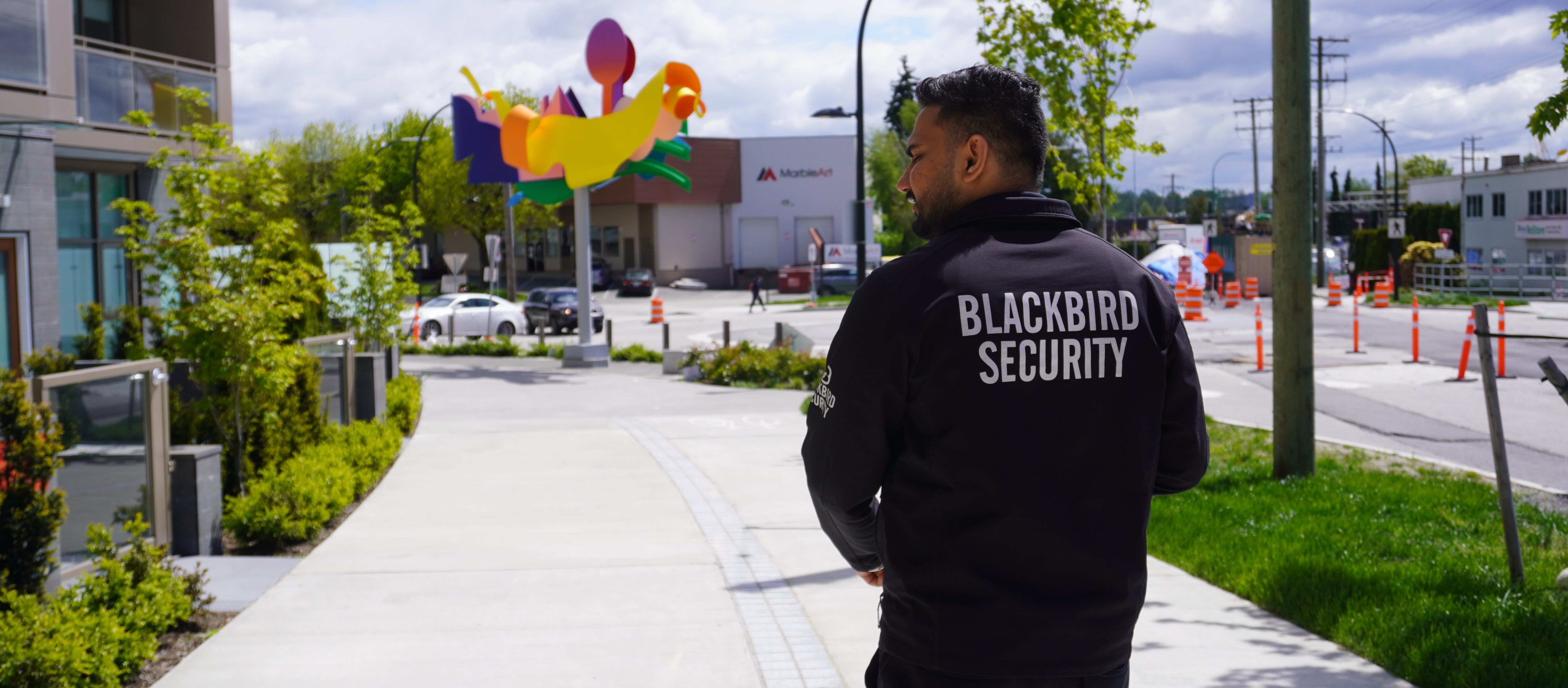
Condominiums are a great place to live, offering tight-knit communities, access to amenities, and the benefits of being centrally located. But with a large number of residents living in close quarters, security can become a concern for residents, strata councils, and property managers. Fortunately, condominium security provides a comprehensive and highly effective solution.
This article is a comprehensive guide for property managers, strata council members, residential security decision-makers, and residents looking to gain insights into condominium security services, based on our years of experience in the industry. You’ll learn the roles and duties of condo security guards, how they keep residents and property secure, and practical tips on choosing a security company for your building.
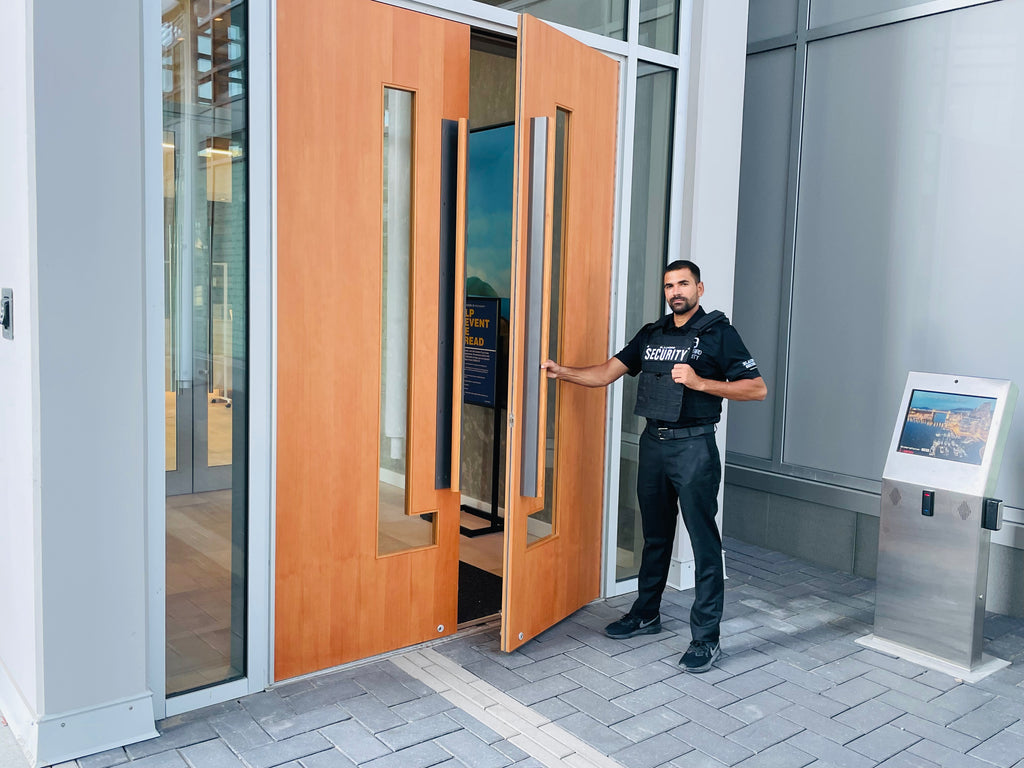
In Canada, property crimes, including burglary, arson, vandalism, and unauthorized entry, are committed nearly 5000 times per day. Chances are, your condominium is located in a city like Vancouver or Toronto, where the risk of crime is far higher than in smaller towns and more rural communities.
When considering threats to condos in Vancouver, for example, crime largely remains concentrated in the downtown core. However, transit expansions throughout the city and property developments near existing stations are leading to an increase in crime outside of downtown. Increasingly dense urban areas combined with a growing population lead to issues surrounding vagrancy, hazardous litter, and theft, putting residents at risk.
Here are the most common threats condominiums face across Canada:
Vagrancy: Particularly when the weather is cold, rainy, or snowy, individuals may seek shelter under covered building entrances. This poses a risk to residents and can lead to unauthorized entry and break-ins.
Unauthorized access: Non-residents who enter a building without permission may be intending to break into units, access amenities, harm residents, or disrupt the building environment.
Tailgating: A type of unauthorized access where trespassers follow a resident (or their vehicle) into the building or inside a key fob-activated elevator.
Vehicle theft: Condominium parkades are appealing burglary targets due to their secluded nature, low foot traffic, low lighting, and the value of the vehicles parked inside.
Mail and package theft: A growing problem in many cities, many condos store mail in a central location within the lobby, making it an easy target for package thieves.
Dangerous litter: Sometimes a by-product of vagrancy, dangerous litter can include needles and broken glass, among other hazards, posing a threat to residents, children, and pets.
Low lighting: Especially during winter, shortened daylight hours can present a safety risk for condos without adequate lighting around the property’s exterior, in parkades, or garbage rooms. Find out more about condo security challenges specific to winter in our blog, Top 5 Security Risks for Condominium Buildings in Winter.
Trash can fires are increasingly becoming an issue for new condos built in neighbourhoods with houses scheduled for demolition. They’re most likely to occur in isolated, poorly monitored areas, including back alleys, parking garages, stairwells, and near loading docks. Flames from trash can fires can quickly spread to other flammable materials, including nearby buildings. Smoke from fires can cause damage and pose a serious health risk if inhaled. Discover how security guards help prevent trash can fires here.
An under-recognized threat to residential buildings is food delivery, which can compromise security when delivery drivers gain access to upper floors. Burglars posing as delivery drivers have been known to break into units to steal from residents who are absent. Find out how security guards cut down risks associated with food delivery in our blog, Why Food Delivery Poses A Threat to Condominium Security.
Fortunately, each of these risks is significantly mitigated when condominium managers invest in security personnel.
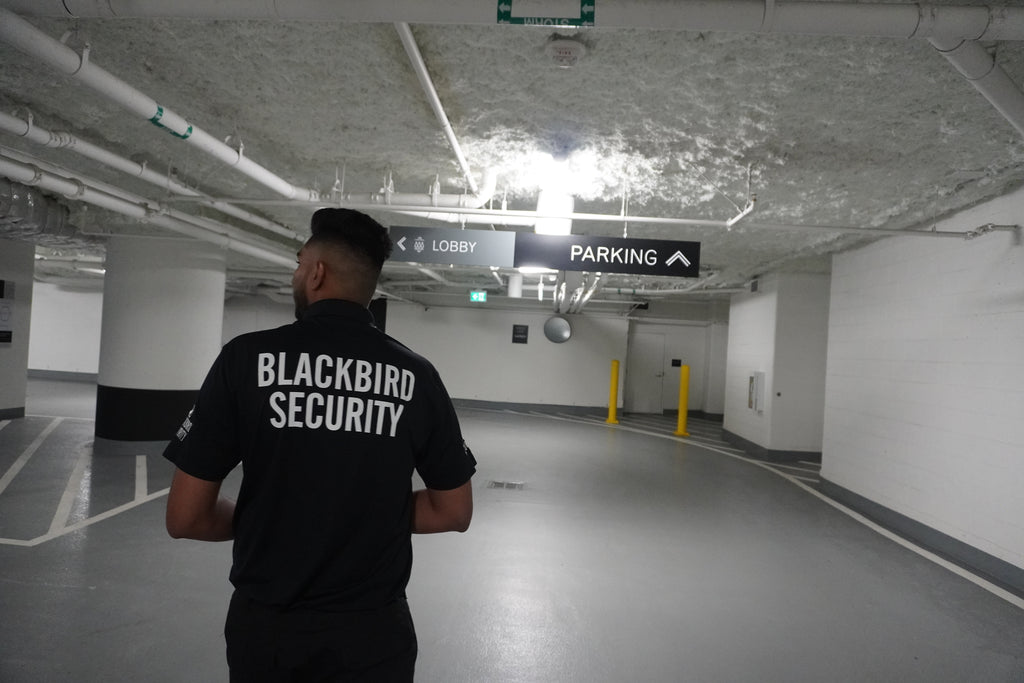
In this section, we’ll outline the roles and responsibilities of each type of security guard that protects condo buildings.
At the core of condominium security is the concierge security guard, a central team member who is the first point of contact for all residents and visitors. They monitor the front entrance and live CCTV cameras while on duty, checking in visitors and ensuring that everyone who enters has permission to be in the building. Concierge security guards help create a friendly and welcoming atmosphere for residents and guests through warm greetings and conversation. Learn more about the role of concierge security guards on our blog.
Unlike concierge security guards, who are primarily stationed at the front desk, patrol guards oversee the entire building during regularly scheduled foot patrols. They wear a distinctive uniform that provides a visible deterrent against potential trespassers, while reassuring residents that their property is protected and help is nearby if needed. We’ll cover patrols in more detail in the next section.
Mobile patrol security guards offer a flexible and cost-effective overnight security solution for condominium buildings that don’t require a 24/7 on-site security presence.
Similar to patrol guards, mobile guards patrol condo properties. The difference is that mobile guards are only present at a property during their scheduled foot patrols, moving between properties in marked security vehicles when the patrol has been completed. This lowers costs compared to on-site guards and can provide an added layer of protection overnight after daytime security teams have gone home.
Mobile patrols are typically conducted on a randomized schedule to prevent criminals from identifying patterns or gaps in security coverage. Unlike static security guards, mobile guards can cover multiple properties in a short period, which is beneficial for management teams in charge of more than one property.
Next, we’ll cover how these guards maintain resident safety at all times.
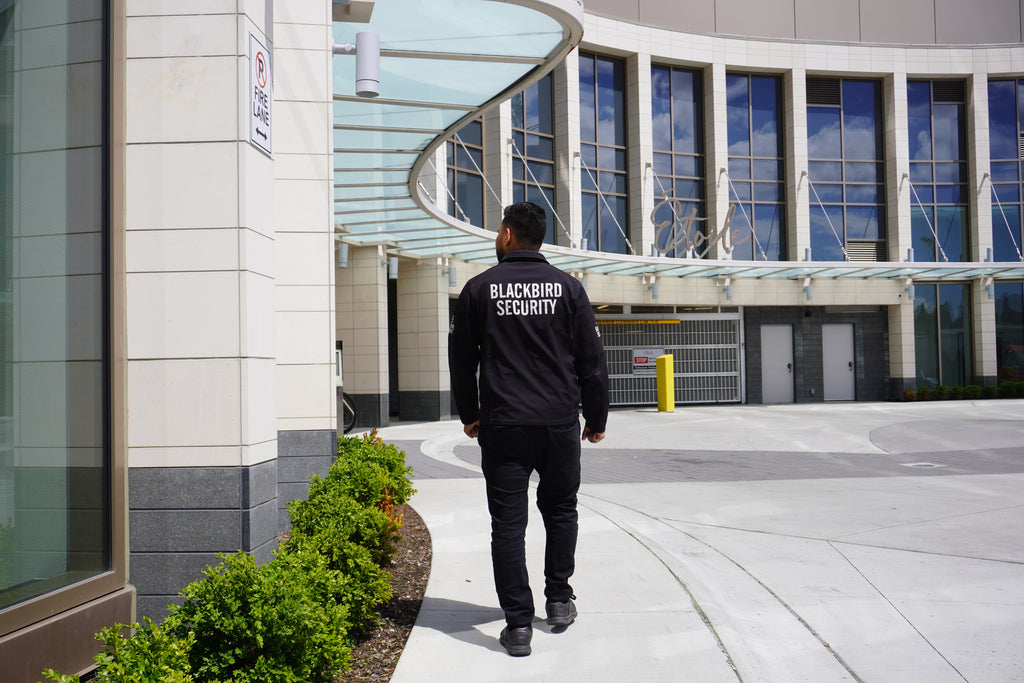
Condominium security guards keep the residents and the buildings they protect safe daily by following protocols, recalling training, and acting decisively. Here’s a breakdown of some of their daily responsibilities.
As patrol routines are strategically planned according to the unique security needs and features of each individual property, every condo’s patrol looks different. Here’s an outline of the most common areas guards check while on patrol:
Perimeter and entrances: Security guards check all exterior-facing doors, windows, and gates to ensure they remain secure. While monitoring the property’s perimeter, guards scan for loiterers or suspicious vehicles parked nearby.
Amenities and common areas: Guards conduct walk-throughs of gyms, pools, lounges, and other resident-only spaces.
Parkade, storage, stairwells, and bike rooms: Guards patrol these areas thoroughly, as they are often closed off from the rest of the building and receive less foot traffic than other areas.
Mechanical rooms, mailrooms, and garbage rooms: Similar to parkades, these often secluded rooms are included on patrol routes to ensure they remain free from trespassing and damage.
In addition to damage, unauthorized personnel, and signs of break-ins, guards also look for maintenance issues and litter, which they report promptly. Curious to learn more about condominium foot patrols? Read our blog, How Condo Security Guards Conduct Overnight Patrols.
Excellent reporting is necessary for effective security and can provide a valuable resource for police in the event of a serious security incident. Guards maintain detailed patrol logs containing photo and video evidence, timestamps, written reports, and actions taken during their shifts. Any security issues, including signs of attempted forced entry, broken locks, and suspicious activity, are reported and addressed immediately. In urgent or emergency cases, security guards will contact police or first responders.
Security companies often leverage technology to assist in the reporting process. For instance, Blackbird Security guards use TrackTik for all reporting, providing our leadership teams and clients with a real-time overview of guard locations, reports, and incidents.
Maintaining safe and secure stairwells is a top priority for condominium security guards. Unsecured street or alley-facing stairwells are appealing places for vagrancy, which may enable theft, vandalism, and drug usage if left unaddressed. Vagrancy can also lead to congestion in the event of an emergency when residents need to escape the building by stairs. Concrete stairwells are often CCTV blind spots, as concrete is difficult for wireless signals to penetrate. As it can be difficult to monitor stairwells remotely, guards regularly patrol them on foot.
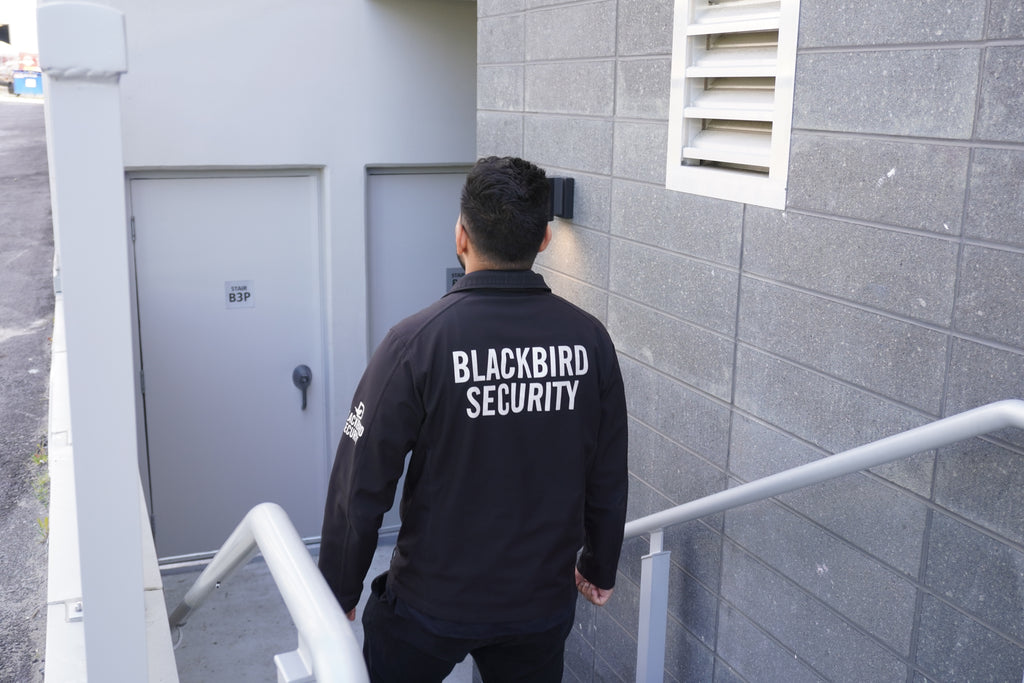
Because concierge security guards build relationships with residents and remain stationed at the lobby desk, they’re able to quickly spot any unfamiliar faces that enter the building and verify their visits. This method of access control is highly effective in preventing unauthorized access from the building’s primary entrance.
When a stranger enters the building, the concierge will greet them, ask their name, and record their information in a visitor log. The guard may also ask the name and unit of the person the unfamiliar individual is visiting to ensure their presence is legitimate. Similarly, if a security guard encounters a suspected trespasser in another area of the building while on patrol, or locates them after witnessing a suspicious entry over CCTV, they will follow the same process. If the individual is unable to identify themselves and provide a reason for their visit, the guard will calmly but firmly ask them to leave the premises.
Security guards can control access to the elevators of many modern condos. If a visitor is suspicious or hostile, the concierge guard will not permit entry to the upper floors of the building, request that the visitor leave, and may contact the police if necessary.
Last but not least, responding to resident concerns is a key component of a condominium security guard’s daily duties. The ideal security team creates a welcoming environment where residents feel comfortable reporting issues and concerns as soon as they arise. Guards take resident reports seriously, address issues promptly, report concerns, and communicate with building managers when needed.
In the next section, we’ll discuss how security guards handle more urgent scenarios.
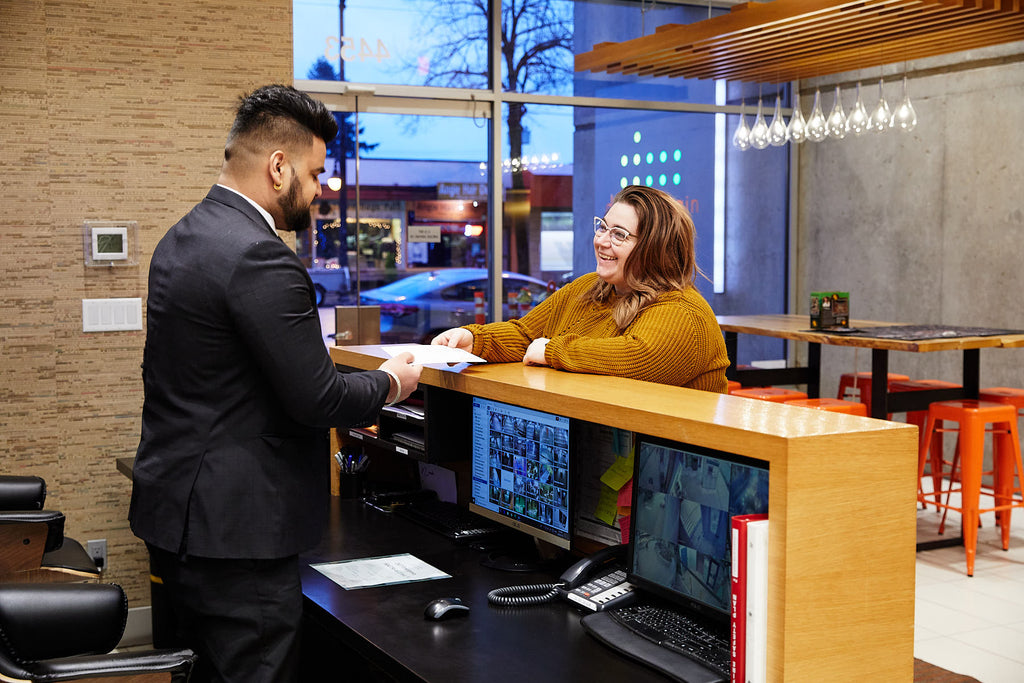
Emergencies are rare and unpredictable, but when they happen, having a team of experienced residential security guards on site is a significant benefit to residents and property managers alike. Guards provide peace of mind, and residents feel more confident knowing help is available when it’s needed. Below are some common emergency scenarios security guards handle.
When a fire alarm is triggered, security guards ensure the safety and well-being of residents. A fast response, combined with decisive leadership and effective crowd control, can be the difference between a chaotic and dangerous evacuation and a smooth one. Guards rely on training, building-specific protocols, and safety plans organized with property managers to safely evacuate residents and coordinate with firefighters, including handing the building’s fire safety plan key to the fire marshal upon their arrival.
For a detailed, step-by-step breakdown, check out our blog, How Security Guards Respond to Fire Alarms in Condominiums.
Floods can be caused by a variety of sources, from burst pipes and running taps to natural disasters. Upon discovery of a flood, guards immediately assess the severity and potential impact. Following the initial assessment, guards promptly notify property management and evacuate affected residents to a safe area of the building. Once residents are safe, they set up safety barriers and signage to restrict access to flooded areas.
Learn more about how security guards respond to condominium floods, including how Blackbird Security guards handled a major flood in BC during November 2021.
Severe weather is becoming more common throughout Canada, and with it come power outages. When a building’s power fails, so do CCTV systems. This is a security risk that must be addressed with frequent foot patrols. Residents may become stuck in elevators, key fobs may lose functionality and prevent access to the building, and garage doors may stop in a partially open position.
All of these issues necessitate a swift and organized response from the building’s security team. This might include checking emergency lights, assisting with manual access control, and helping residents. For more information, check out our blog, How Security Guards Respond to Power Outages.
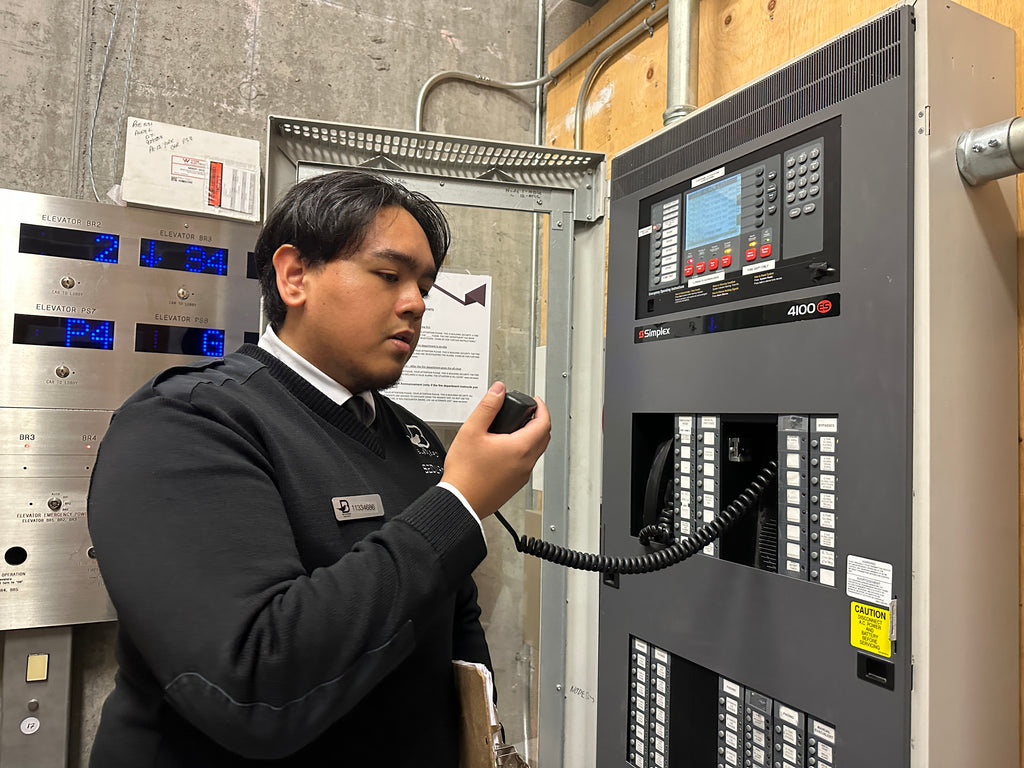
A broken or stuck elevator is typically a rare occurrence, but it can happen due to misuse, faulty equipment, or power outages, as we’ve just discussed. When handling an elevator entrapment, guards must strike a balance between helping panicked occupants stay calm and adhering to protocols. Condo security guards communicate with both maintenance teams and the occupants trapped inside, monitoring and supporting elevator occupants throughout the process. Crucially, guards will only dial 911 when necessary, such as in the event of a medical emergency or if requested.
Like floods, summer heatwaves have affected Canada more frequently during recent years. Tragically, 619 individuals lost their lives throughout BC during the 2021 heat dome. Residents with special needs, medical conditions, and seniors are the most affected by heatwaves, and security guards can ensure they receive the help they need during weather events. Guards may conduct wellness checks and provide access to cool areas for residents who need it during the heatwave. To proactively prevent emergencies, guards alert building management to air conditioning maintenance issues when they’re discovered or reported.
Read our blog, How Condominium Security Guards Ensure Resident Safety During Heat Waves, to learn more.
During an emergency, security guards are not only the first ones on the scene, but may also contact first responders if a resident is at risk. During the call, they closely follow instructions and answer questions from dispatch, along with enacting building safety protocols, to ensure first responders have the information they need to respond swiftly.
Residents may dial 911 for paramedic or police assistance for themselves, a neighbour, or a visitor. In buildings without an on-site security presence, first responders must rely on buzzer systems to grant them access to the building. This poses a serious safety threat during time-sensitive emergencies, as the individual who made the call may be unable to let them in, and condo neighbours may not answer. Fortunately, condominium security personnel can allow first responders into the building promptly, bypassing the unreliable buzzer entry method and saving precious minutes.
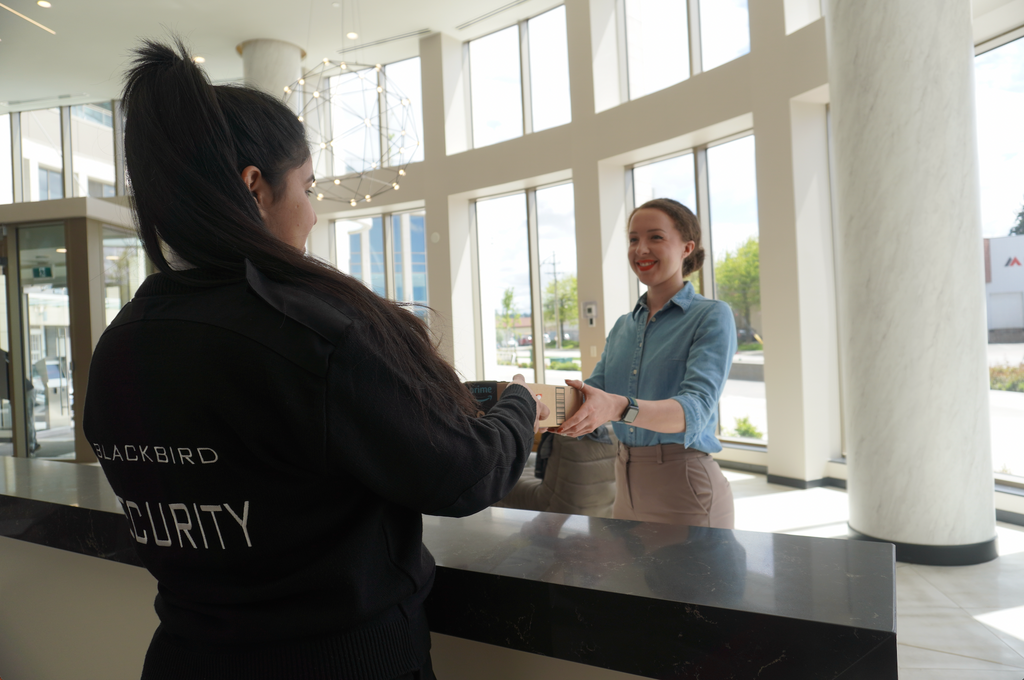
Besides providing lifesaving assistance in emergencies and conducting daily duties to keep residents safe, condo security guards perform a variety of tasks that often go unnoticed by those looking on from the outside. Below are some unexpected guard duties that our prospective condo security clients often find pleasantly surprising.
As we mentioned earlier, mail and package theft can be an issue in condo buildings. As a result, concierge security guards can double as package concierges. They receive, log, and safely store packages in a secure location for pickup by verified residents later. This mitigates package theft, improves resident satisfaction, and promotes a healthy residential community.
While on patrol, security guards keep watch for maintenance issues, including leaking pipes, broken CCTV cameras, property damage, burnt-out lights, damaged locks, and litter. They also report air conditioning and fire alarm issues. These reports are shared with property management teams, and guards may communicate directly with maintenance depending on the requirements of building leadership. This process ensures that all issues are caught and addressed swiftly, preventing them from becoming bigger issues in the future.
Lockouts happen, and when they do, residents are always thankful to have security guards at hand. When a resident accidentally locks themselves out of their unit or the building, security guards are there to help. Depending on the building, security guards may either unlock the doors of units directly or facilitate communication on behalf of the resident to help unlock their door, whether by contacting the building manager or a locksmith.
Security guards can respond to noise complaints, providing support for property managers who would otherwise have to handle these time-consuming and sensitive situations on their own. If the source of the noise is a resident unit, for instance, a party or loud music, the security guard will knock on the unit’s door and respectfully request that they turn the music down. Find out our step-by-step process for responding to noise complaints here.
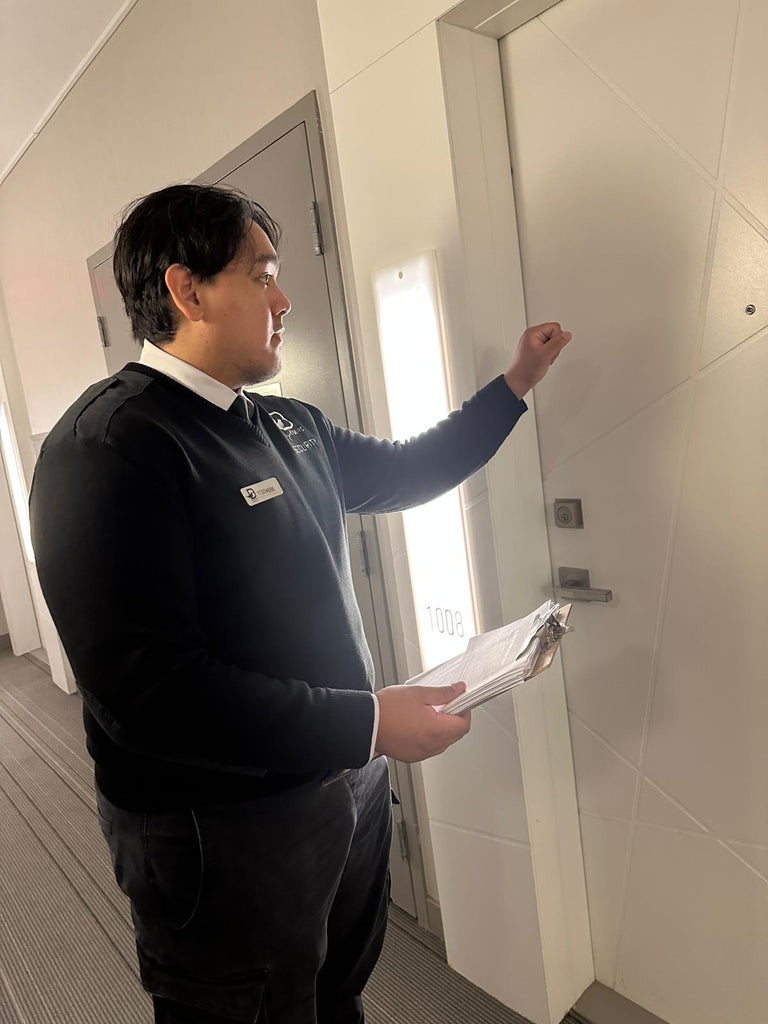
You may be aware that police conduct wellness checks when an individual is, or is suspected of being, in need of assistance. It might surprise you to learn that residential security guards can also conduct wellness checks.
Concerned family members, neighbours, or building management may request these checks when a resident hasn’t been seen or heard from for an extended period of time. Security guards follow a strict protocol for this procedure, which you can learn about in our blog, Condominium Security Procedures for Resident Wellness Checks.
Security guards can host emergency preparedness training sessions for residents or strata council members. These sessions educate attendees about evacuation procedures, emergency protocols, and safety best practices. Collective emergency preparedness ensures residents are all on the same page when it comes to safety and contributes to a safer living environment.
Moving days can lead to unintended gaps in a building’s security, with increased foot traffic and propped-open doors providing opportunities for unauthorized access. Moving trucks and other vehicles may also obstruct no-parking zones or emergency vehicle access. To combat these issues, security guards monitor building entrances, log moving workers, and supervise loading zones. Find out more in our blog, How Residential Security Guards Manage Moving Days.
Airbnbs can cause disruptions for permanent condo residents and may be prohibited by strata councils and property managers. Unfortunately, this sometimes isn’t enough to stop individuals looking to capitalize on their property from hosting Airbnb guests.
“Condominiums with a good security team can recognize regular residents and build a sense of community,” says Blackbird Security’s Organizational Development Manager, Erika Taijiri, “Airbnbs dilute the sense of community in a building and make it harder for security to identify suspicious people.”
To help property managers take action against Airbnb rule breakers, condo security teams closely monitor for signs of short-term rentals, report evidence, and can collect resident input to support their case. Discover the issues associated with short-term rentals and learn more about how security guards prevent them on our blog.
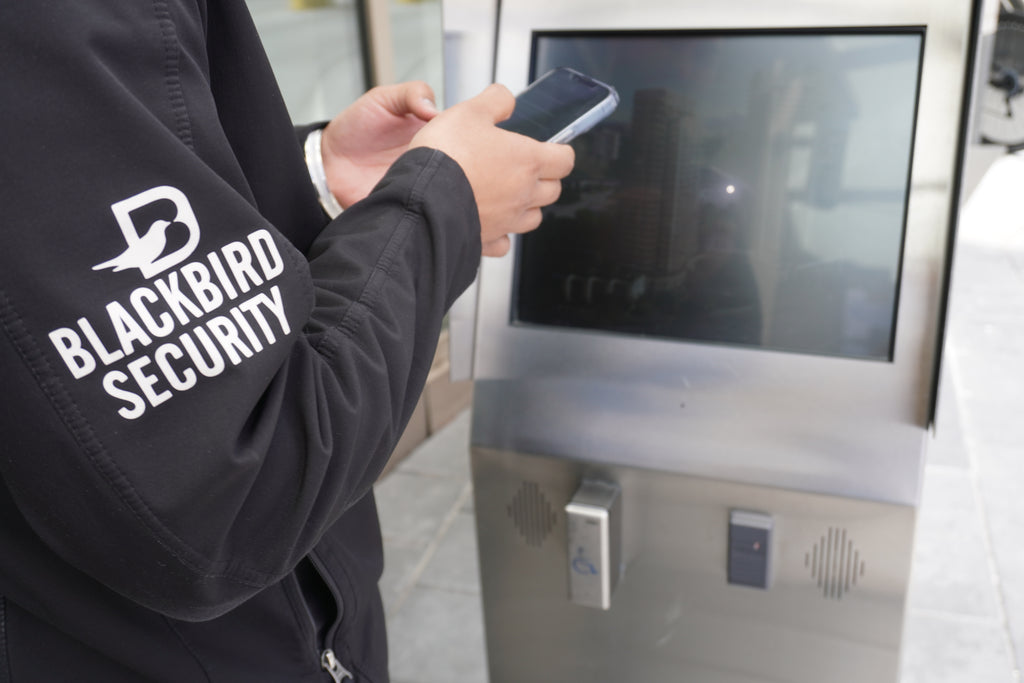
Now that you’re familiar with the duties of condominium security guards and how they uphold safety in residential buildings, the next step is determining if a security company is right for your building. Below is a checklist of questions you can use when browsing for, communicating with, and choosing a security company.
Does this company offer a dedicated manager and team? Having a dedicated manager and team assigned to your condo builds a more responsive relationship between property management, residents, and your condo’s security personnel.
Does this company provide customized services that can be tailored to your property’s specific challenges? Your building isn’t the same as the one next door or across town. The right security company will take the time to understand your needs and develop a personalized strategy.
Does this company service all of Canada, or just your area? A company with a national scope has more resources and expertise in condo security and will have better SOPs and training programs available to its guards.
Do security guards at this company understand emergency procedures? Your chosen company should have a thorough understanding of emergency procedures and a proven track record of satisfaction in emergency response. When in the discovery phase, ask questions like:
What is your fire alarm response procedure?
Do you have a protocol in place in the event an alarm is triggered during overnight hours?
What training do your guards receive?
How important is customer service to this security company? Building relationships with residents and management staff is a key component of condominium security, as outlined in section two. A company that prioritizes customer service will be more proactive in addressing concerns than one that isn’t.
What deportment options does this company offer? The uniform that condo security guards wear can be critical when creating a welcoming environment for your residents. Depending on your building’s needs, you may want anything from a prominent uniform to discrete suit-and-tie clothing. The right company will offer you options to choose from.
What reviews and references does this company have? Ask the company for references from other condos that have used the services you’re considering. Look for insights on performance, reliability, and overall effectiveness. Google reviews can also be a good indicator of a company’s quality.
This checklist will help you determine whether a given security company is high-quality or not.
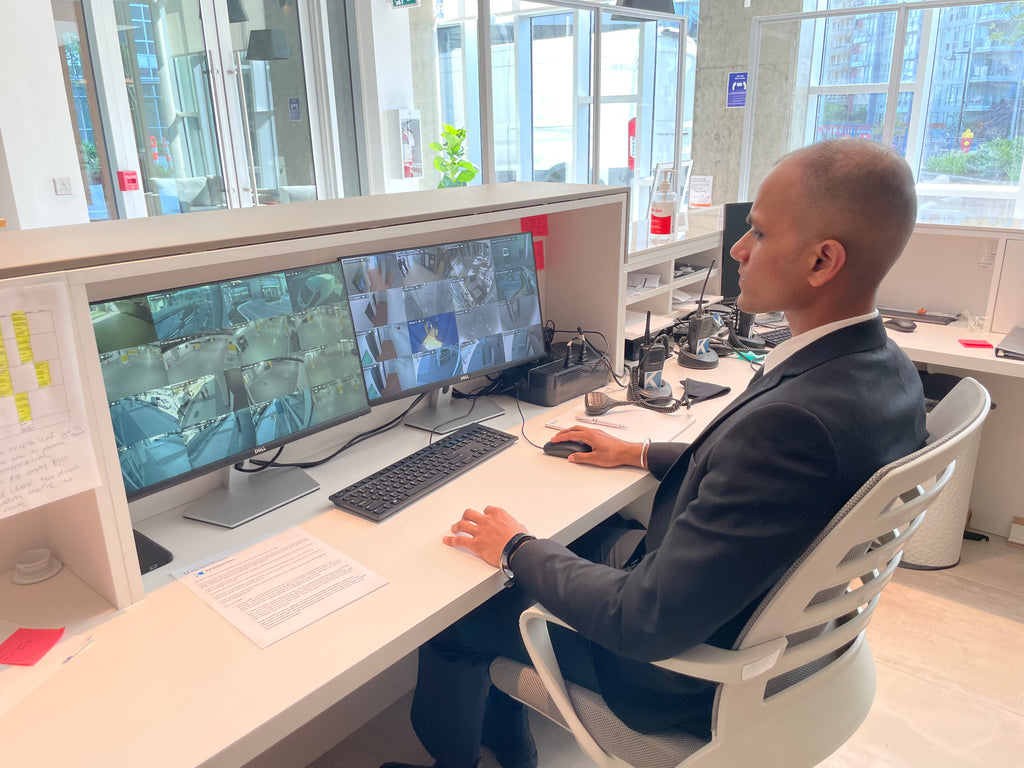
The first step in determining how many security guards you need at your property is evaluating your condo’s security needs. Will on-site security be required during specific hours, or 24/7? What are your key areas of concern? How many amenities do you have? How big is the property? Do you have any safety concerns, or does your building have a history of security incidents? These questions will help you get an understanding of your security needs for the purposes of budgeting.
Ultimately, the security company you decide to partner with should provide recommendations and rationale for the number of security guards your building is likely to need. Read our condo security tips and best practices to find out how secure your property is.
We’re proud to offer an industry-leading security training program for Blackbird Security guards. Through Blackbird Academy, our guards receive advanced training beyond the Basic Security Training required to earn a security license in Canada. This training prepares them for real-world scenarios and equips them with the knowledge to provide top-level service from day one.
Blackbird Academy training modules include:
Advanced Communication Mastery: Essential Skills and Verbal Judo
Fire Safety Training
Workplace Harassment
Reporting Excellence
Building a Diverse, Equitable, and Inclusive Workplace
Use of Force
Customer Service Excellence
Peaceful De-Escalation Training
Report Writing
Introduction to Canadian Criminal Law
Standard First Aid
Nonviolent Crisis Intervention (CPI-Certified)
Legislation & Legal Authority Training
During training, our guards are guided by award-winning in-house instructors in partnership with accredited institutions, including the Crisis Prevention Institute, Lifeguarding Academy, St. John’s Ambulance, and The Justice Institute of BC. Partnering with institutions ensures our guards receive the most up-to-date training information.
With a foundation of excellent training, our guards provide premium condo security services to our clients across Canada.
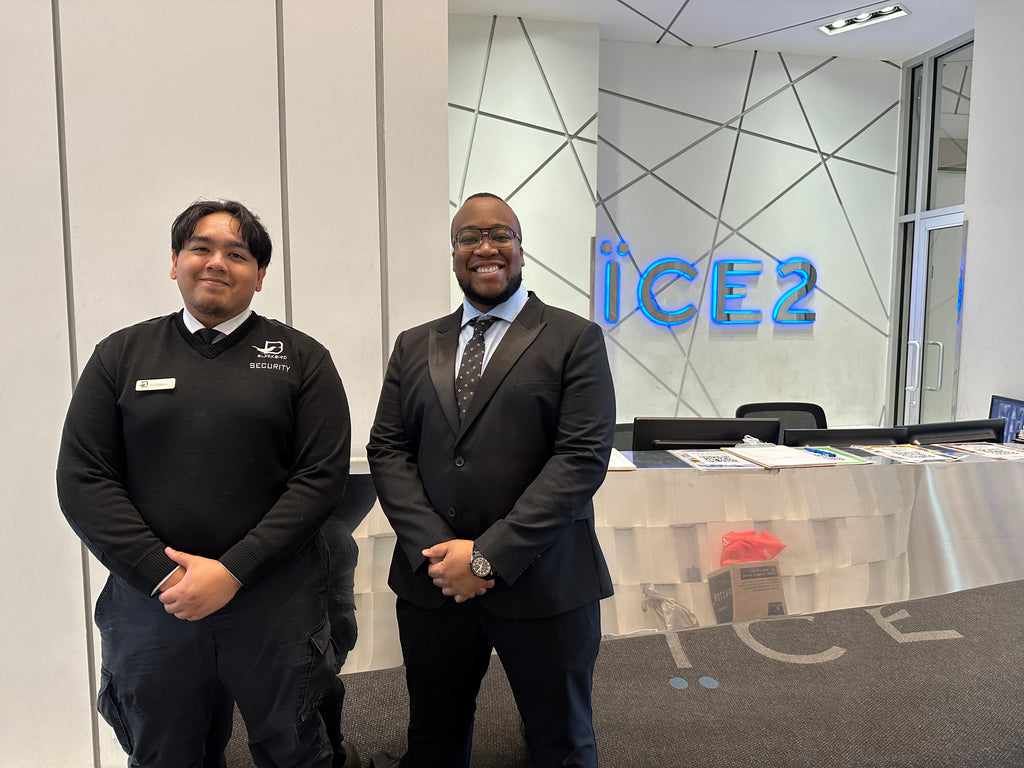
When the safety and comfort of residents are at stake, it’s up to condominium decision-makers to provide a solution. Investing in professional security services is the key to a safe and secure environment, and partnering with a professional security company is the most effective way to ensure the safety of your property and residents. When you bring a professional security company on board to safeguard your condo, residents feel safer, management teams and strata councils gain peace of mind, and your residential community thrives.
Don’t wait to protect your building against security threats. Get in touch with us today, and a member of our team will be in touch to share how our condo security services can safeguard your property.



